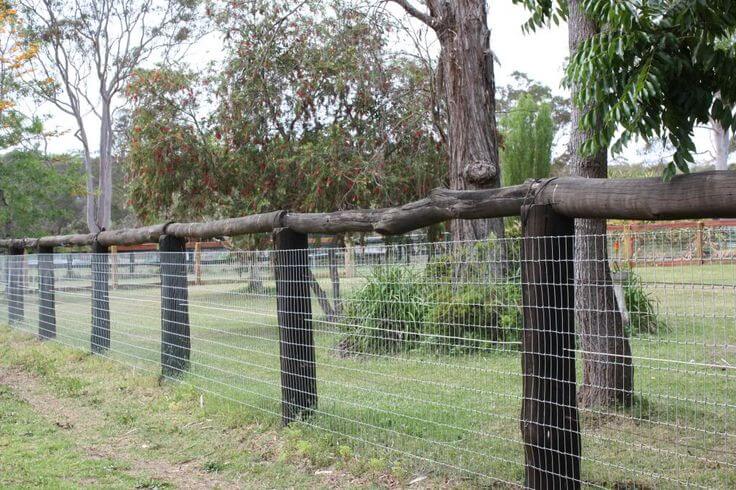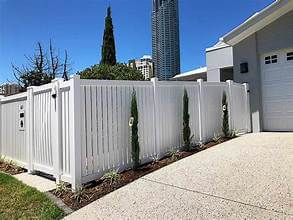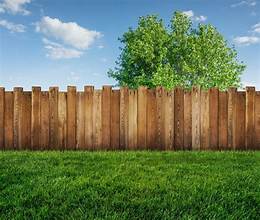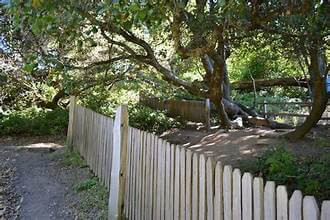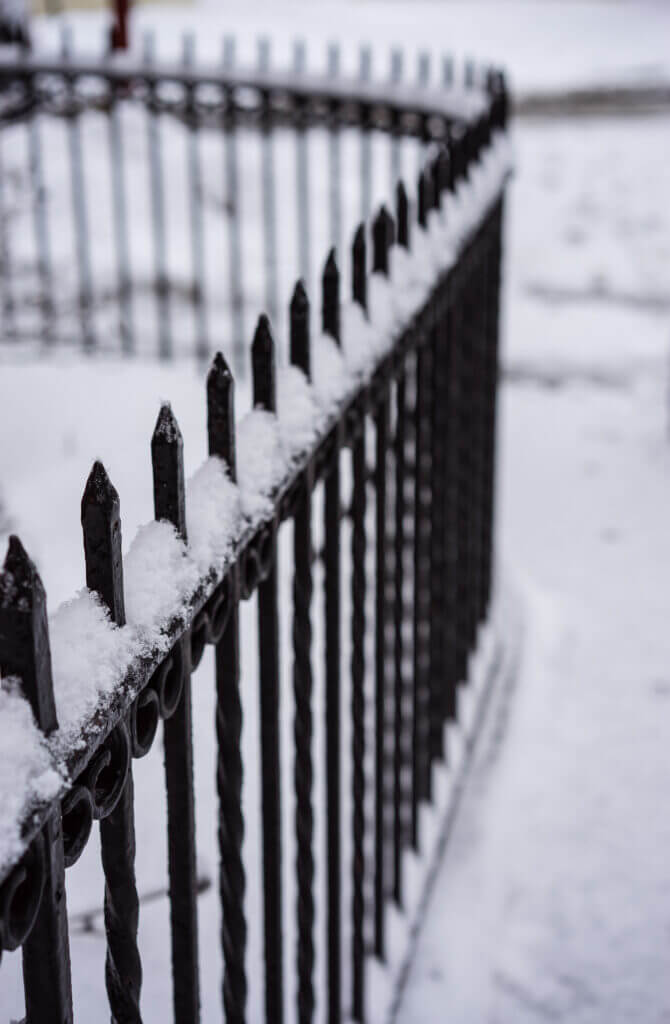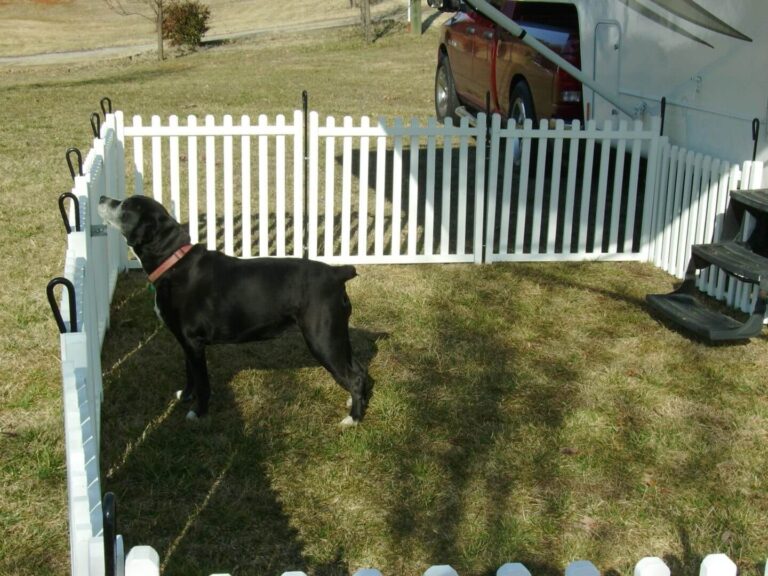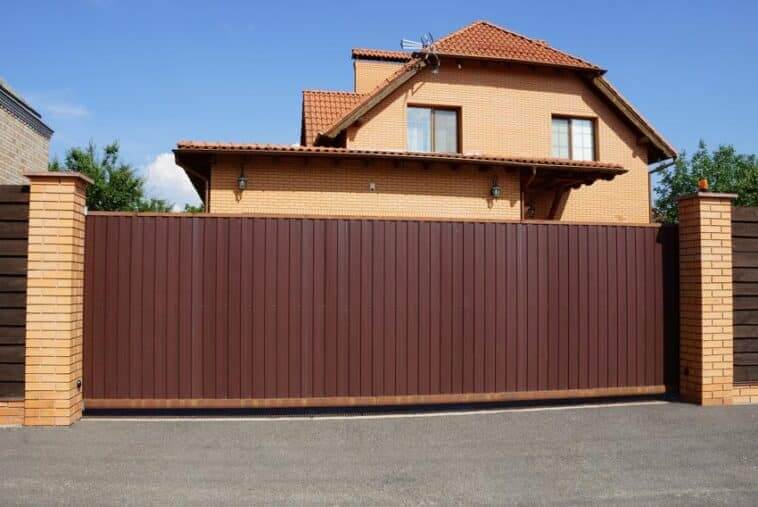Choosing fencing in mountainous terrain requires considering durability, flexibility, and compatibility with the natural landscape. It is essential to select fencing materials that can withstand harsh weather conditions and uneven surfaces while blending seamlessly into the surroundings.
Factors such as material strength, ease of maintenance, and aesthetic appeal must be carefully evaluated to ensure the fencing meets both functional and visual requirements.
In mountainous areas, the fencing not only serves a practical purpose but also contributes to the overall landscape’s beauty.
As such, selecting the right fencing involves a thoughtful consideration of factors such as terrain, climate, and the intended purpose of the fencing.
By understanding these considerations, you can make an informed decision that balances functionality and aesthetics for the best results in mountainous terrain.

Factors Impacting Fencing In Mountainous Terrain
Understanding these factors is crucial for choosing the right fencing solutions. In such areas, careful planning, consideration of local topography, and the use of durable materials are essential.
The article could benefit from emphasizing the importance of materials tailored to withstand harsh weather conditions, ensuring longevity and functionality in challenging terrains.
For property owners in mountainous regions, explore Fencing San Mateo for reliable fencing solutions designed to endure the demands of elevated terrains.
Soil Composition
The composition of soil in mountainous terrain varies significantly, ranging from rocky, gravelly soils to silty loam. Ensuring that the fencing materials are compatible with the soil type is essential for stability and longevity.
Installing fencing in areas with rocky soil may require specialized equipment and techniques to anchor the posts securely.
Weather Conditions
Mountainous regions are often exposed to extreme weather conditions, including heavy snowfall, strong winds, and rapid temperature fluctuations.
Selecting fencing materials that are resistant to corrosion, such as galvanized steel or aluminum, can prolong the lifespan of the fence in adverse weather.
Additionally, choosing a design that minimizes wind resistance is crucial to prevent damage during storms.
Wildlife Behavior
The mountainous terrain is home to diverse wildlife species that can impact fencing, including deer, elk, and small mammals.
Considering the behavior of wildlife is essential when designing fences to prevent animals from damaging or burrowing underneath them.
Installing additional deterrents such as electric fencing or wildlife-friendly barriers can help protect the fence and the surrounding ecosystem.
Choosing The Right Material For Mountainous Terrain
When selecting fencing for mountainous terrain, it’s crucial to choose the right material that can withstand the unique challenges presented by rugged landscapes.
Factors such as durability, maintenance, longevity, and environmental impact should be carefully considered to ensure the fencing is both effective and sustainable in such demanding conditions.
Let’s delve into the essential considerations for selecting the most suitable fencing material for mountainous terrains.
Considerations For Durability
Durability is paramount when choosing fencing for mountainous terrain.
The material must be able to withstand harsh weather conditions, extreme temperatures, and potential impacts from natural elements such as rocks and debris.
Opting for robust materials like steel, aluminum, or wrought iron can provide the necessary strength and resilience required to endure the rugged topography of mountainous areas.
Maintenance And Longevity Factors
Maintenance and longevity are vital aspects to consider when selecting fencing for mountainous terrain.
In such challenging environments, regular maintenance may be difficult, so choosing low-maintenance materials like vinyl or composite materials can help ensure the longevity of the fencing with minimal upkeep required.
Additionally, investing in coatings or treatments to prevent corrosion and weathering can significantly extend the lifespan of the fencing, providing long-term value and protection.
Environmental Impact
Considering the environmental impact of the fencing material is crucial in mountainous terrain.
Opting for sustainable and eco-friendly materials such as recycled steel or bamboo can align with environmental conservation efforts while maintaining the necessary strength and durability.
Ensuring that the selected material is eco-conscious and does not contribute to environmental degradation is essential when choosing fencing for mountainous landscapes.
Assessing Terrain Specifics
When choosing fencing for mountainous terrain, it’s crucial to assess the specific features of the land to ensure the fence is not only functional but also durable.
Here are key factors to take into account to make an informed decision:
Evaluating Slope And Elevation
One of the fundamental aspects to consider when installing fences in mountainous areas is the slope and elevation of the land.
Assess the degree of inclination and the varying elevations to determine the best positioning and design of the fence.
Opt for fencing materials and installation methods that can accommodate the terrain’s irregularities without compromising the integrity of the structure.
Analyzing Soil Stability
Analyze the stability of the soil in the area where the fence will be installed. Identify any areas prone to erosion or landslides that could affect the stability of the fence.
Select fencing materials that are suitable for the specific soil conditions and ensure proper anchoring and support to withstand the natural movements of the terrain.
Accounting For Drainage
Consider the drainage patterns of the mountainous terrain to prevent water accumulation that can affect the longevity of the fence.
Plan for adequate drainage mechanisms and choose materials that can withstand moisture without rotting or weakening.
Proper management of water flow in the area can help preserve the fence and the surrounding landscape.
Customizing Fencing Solutions
Customizing fencing solutions is crucial when dealing with the unique challenges of mountainous terrain.
Understanding how to tailor the height and width, incorporate reinforcements, and integrate aesthetics can make all the difference in choosing the right fencing for your mountain property.
Tailoring Height And Width
When dealing with mountainous terrain, the height and width of the fencing should be carefully considered.
Higher fences can provide better security, while wider fences may offer more stability on uneven ground.
Customizing fence heights based on the surrounding landscape can help maintain property boundaries and ensure the safety of both people and animals.
Incorporating Reinforcements
Reinforcements such as bracing, anchors, and proper installation techniques are essential components when customizing fencing for mountainous terrain.
The reinforcement of the fencing with sturdy materials and strategic design can strengthen its ability to withstand the challenges of inclement weather and natural slopes.
Carefully evaluating the need for reinforcements based on the specific topography can prevent potential damage and secure the longevity of the fencing.
Integrating Aesthetics
The visual appeal of fencing in mountainous terrain is just as important as its functionality.
Integrating aesthetics through the use of natural materials, earth tones, and strategic placement can enhance the overall landscape, creating a seamless blend between property boundaries and the surrounding environment.
Customizing the appearance of the fencing can contribute to the property’s aesthetic value while ensuring it complements the natural beauty of the mountainous terrain.
Installation And Maintenance Tips
When installing a fence in mountainous terrain, it is important to choose durable materials that can withstand the harsh environment.
Opt for steel or aluminum fencing for its strength and longevity, and make sure to secure the posts deeply into the ground to provide stability against the rugged landscape.
Regular maintenance, including inspecting for loose connections and repairing any damages, is crucial to ensure the fence remains secure and effective in mountainous regions.
Addressing Structural Integrity
When installing fencing in mountainous terrain, structural integrity is crucial for ensuring it can withstand the natural elements and the elevation changes.
Choose fencing materials such as steel, aluminum, or vinyl that are durable and can endure the challenges posed by mountainous environments.
Prioritize the installation of sturdy posts anchored securely in the ground to provide essential support for the fencing.
Utilizing a professional installation service can ensure that the fence is properly constructed with a focus on enduring structural integrity.
Implementing Routine Maintenance
Routine maintenance for mountainous terrain fencing is essential for its longevity and performance.
Regular inspections should be conducted to check for any signs of damage, including loose components or corrosion, and to address them promptly.
Additionally, periodically applying protective coatings or treatments to the fencing material can enhance its resistance to weathering and environmental factors
Commonly found in mountainous regions. Implement a scheduled maintenance plan to keep the fence in optimal condition and mitigate potential risk factors.
Ensuring Safety Standards
When installing fencing in mountainous terrain, safety standards must be rigorously upheld to prevent accidents and ensure the well-being of individuals and wildlife.
Conduct thorough assessments of the terrain to identify potential hazards such as steep slopes or rocky outcrops that may necessitate specific safety measures around the fencing area.
Additionally, incorporating safety features like warning signs, reflective markers, or wildlife-friendly designs can contribute to a secure and responsible fencing installation in mountainous terrain.

Frequently Asked Questions
How Do I Choose The Right Fencing For Mountainous Terrain?
It’s crucial to consider the durability, flexibility, and erosion resistance of the fencing material.
What Are The Best Fencing Options For Mountainous Regions?
Fencing options such as welded wire, chain link, and electric fencing are suitable for mountainous terrain.
Why Is It Important To Consider Weather Conditions When Choosing Fencing?
Adverse weather can impact fencing integrity, so selecting weather-resistant and sturdy materials is essential.
Conclusion
To sum up, choosing the right fencing for mountainous terrain requires careful consideration.
Understanding the unique challenges and opportunities associated with this environment is crucial for a successful fencing solution.
By factoring in elements such as weather conditions, wildlife, and soil stability, you can make informed decisions that will ensure the longevity and effectiveness of your fencing.

